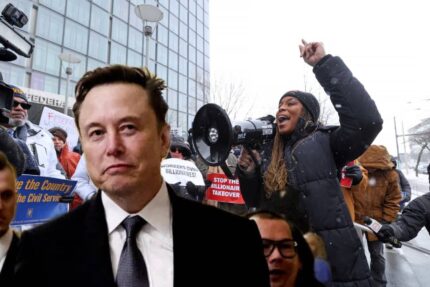A wave of confusion swept across U.S. federal agencies on Monday as employees struggled to navigate contradictory guidance regarding an Elon Musk-backed demand requiring them to justify their weekly work. The controversy erupted after Musk, leading the newly established Department of Government Efficiency (DOGE), issued an email order on Saturday titled “What did you do last week?” The message instructed roughly 2.3 million federal workers to list five examples of their accomplishments from the past seven days or face termination.
Initially framed as a mandatory directive, the email set off immediate alarm among government employees, with unions and agency heads questioning its legality and purpose. Just 48 hours later, the Office of Personnel Management (OPM) appeared to walk back the order, stating that responses were voluntary and that agencies could determine their approach independently. However, the situation took another turn when President Donald Trump publicly supported Musk’s directive, declaring that employees who failed to comply would be either “fired or sort of semi-fired.”
Government Agencies Issue Contradictory Guidance
The chaotic rollout of the email directive was compounded by conflicting instructions from different federal agencies. Key departments, including the Justice Department, Department of Defense, Health and Human Services (HHS), and the FBI—now under the leadership of Trump appointees—advised employees to ignore the email, arguing that it lacked legal standing. Meanwhile, other agencies took a more cautious approach, with some issuing internal memos urging compliance to avoid potential disciplinary action.
This inconsistency left employees in limbo, unsure whether non-compliance would jeopardize their jobs. Many workers expressed frustration over the lack of clear communication from their agencies. One HHS employee, speaking anonymously to the BBC, said, “They’re succeeding in driving us insane. We don’t know whether to respond or ignore it.”
On Monday afternoon, OPM convened a call with federal agency HR heads, stating that individual agencies had the discretion to handle the directive as they saw fit. However, this guidance did little to resolve the uncertainty, as agencies remained split on how to proceed.
Unions and Lawmakers Condemn Musk’s Directive
The email directive faced immediate backlash from federal worker unions and Democratic lawmakers, who denounced it as an intimidation tactic designed to undermine career civil servants. Everett Kelley, president of the American Federation of Government Employees (AFGE), condemned Musk’s move as both legally questionable and an insult to public servants. “Federal workers should not be subjected to such arbitrary and baseless threats,” Kelley stated, vowing to challenge any terminations resulting from the order.
House Minority Leader Hakeem Jeffries called the directive “illegal and reckless”, emphasizing that Musk lacked the legal authority to enforce such demands. Meanwhile, legal experts raised concerns that interpreting non-response as resignation could violate federal employment protections, which require due process before termination.
Despite the uproar, President Trump doubled down on his support for Musk’s initiative, calling it a “genius” idea to root out inefficiency in the federal workforce. Speaking to reporters at the White House, Trump stated, “If people don’t respond, maybe they don’t actually exist. If they do exist and still don’t respond, they’re probably not doing much work anyway.”
Musk Reinforces Ultimatum Amid Growing Legal Challenges
As opposition to the directive mounted, Musk took to his social media platform, X (formerly Twitter), to reaffirm his stance. He announced that employees who had not responded by Monday’s deadline would be given a “final chance” to comply. “Failure to respond a second time will result in termination,” Musk posted, claiming that the directive was part of a broader effort to ensure taxpayer money was being well spent.
Musk further criticized federal agencies that advised employees to ignore the order, accusing them of incompetence. “The email request was utterly trivial—all they had to do was type a few words and press send. Yet so many failed even that inane test, urged on by their managers. Have you ever witnessed such INCOMPETENCE and CONTEMPT for taxpayers?” he wrote.
However, federal unions swiftly responded by filing a lawsuit in a California court seeking to block the enforcement of Musk’s directive. The lawsuit, backed by multiple labor groups, argues that the order violates federal employment laws and represents an unlawful attempt to force resignations.
Uncertain Future for Federal Employees
With agencies divided, lawsuits pending, and political tensions escalating, the fate of federal employees remains uncertain. Some agency heads have reportedly advised workers to comply “just to be safe”, while others have reassured employees that failing to respond will not impact their employment status.
Meanwhile, White House Press Secretary Karoline Leavitt sought to downplay the controversy, stating, “Everyone is working together as one unified team at the direction of President Trump. Any notion to the contrary is completely false.” However, she did not address why different agencies were issuing conflicting instructions.
As federal workers await further clarification, the broader implications of Musk’s demand continue to unfold. With legal battles looming and political debates intensifying, the controversy surrounding Musk’s directive is far from over. Whether it will succeed in reshaping federal workforce accountability or merely deepen partisan divides remains to be seen.














